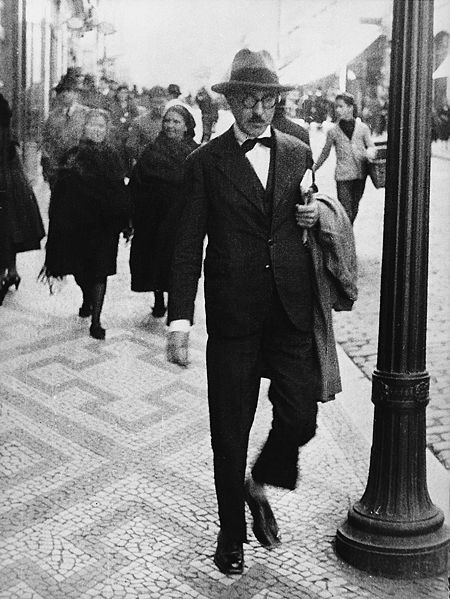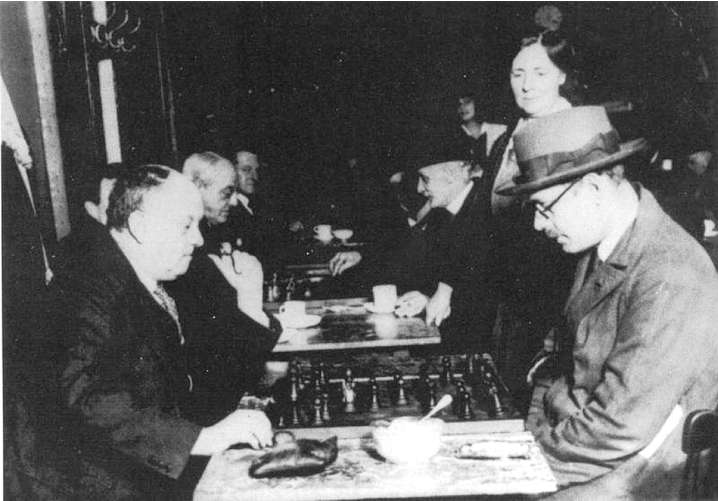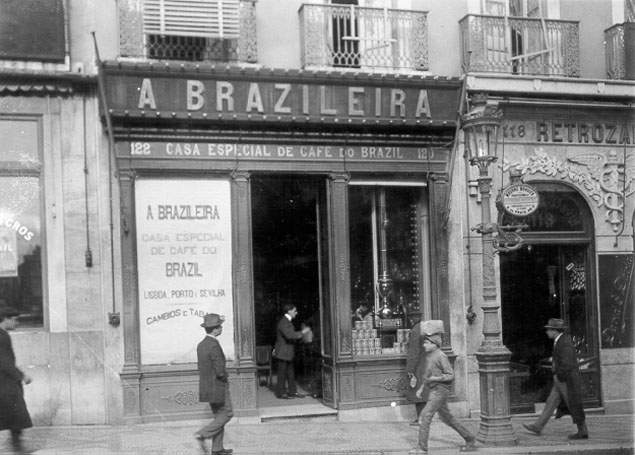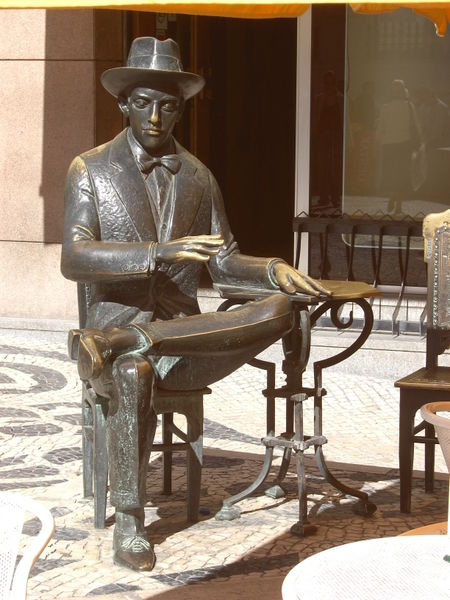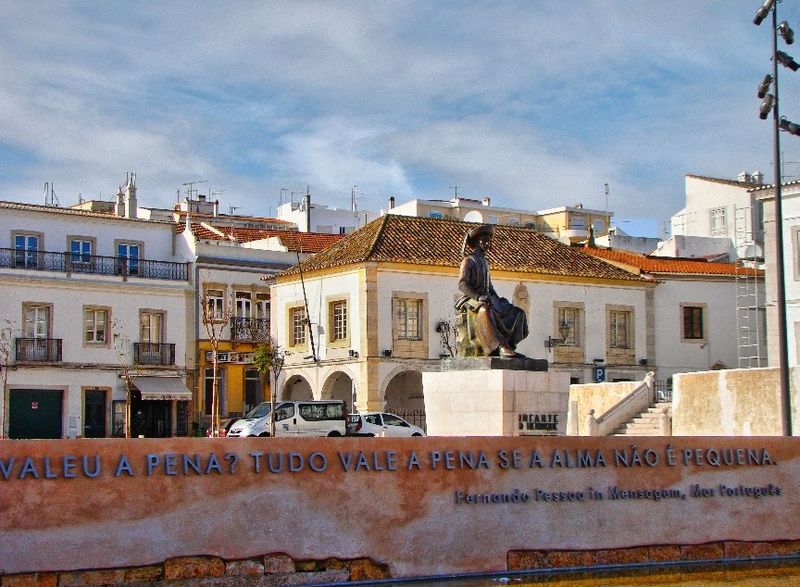<Back to Index>
- Mathematician Grigori Yakovlevich Perelman, 1966
- Poet Fernando António Nogueira de Seabra Pessoa, 1888
- Proconsul of the Roman Empire Gnaeus Julius Agricola, 40
PAGE SPONSOR
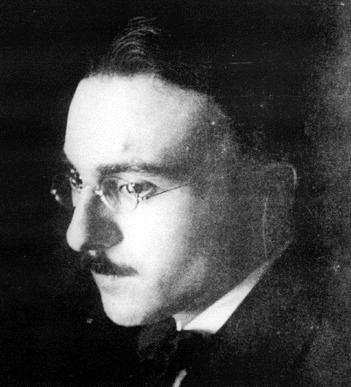
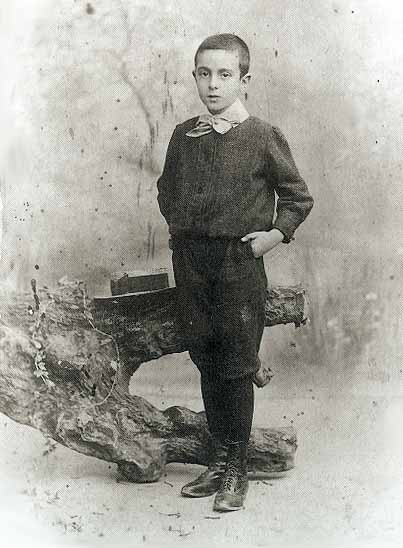
Fernando António Nogueira de Seabra Pessoa, known mainly as Fernando Pessoa (June 13, 1888 in Lisbon, Portugal -- November 30, 1935, Lisbon), was a Portuguese poet, writer, literary critic and translator, one of the most significant literary figures of the 20th century and one of the greatest poets of all time.
On 13 July 1893, when Pessoa was five, his father, Joaquim de Seabra Pessôa, died of tuberculosis. The following year, on 2 January, his younger brother Jorge, aged only one, also died. His mother Maria Madalena Pinheiro Nogueira married again in December 1895. In the beginning of 1896, he moved with his mother to Durban, capital of the former British Colony of Natal, where his stepfather João Miguel dos Santos Rosa, a military officer, had been appointed Portuguese consul. The young Pessoa received his early education at St. Joseph Convent School, a Catholic grammar school run by Irish and French nuns. He moved to Durban High School in April, 1899, becoming fluent in English and developing an appreciation for English literature. During the "Matriculation Examination," held at the time by the then University of the Cape of Good Hope, forerunner of the University of Cape Town, in November 1903, he was awarded the recently created "Queen Victoria Memorial Prize" for best paper in English. While preparing to enter university, he also attended the Durban Commercial School during one year, in the evening shift.
Meanwhile he started writing short stories in English, some under the name of David Merrick, many of which he left unfinished.
At the age of sixteen, The Natal Mercury (July 6, 1904 edition) published his poem "Hillier did first usurp the realms of rhyme...", under the name of Charles Robert Anon, along with a brief introductory text: "I read with great amusement...". In December, The Durban High School Magazine published his essay Macaulay. From February to June, 1905, in the section "The Man in the Moon," The Natal Mercury also published at least four sonnets by Fernando Pessoa: "Joseph Chamberlain", "To England I", "To England II" and "Liberty". His poems often carried humorous versions of Anon as the author's name. Pessoa started using pen names quite young. The first one, still in his childhood, was Chevalier de Pas, supposedly a french noble. Later on, the young writer also signed up as Horace James Faber or Alexander Search, another meaningful pseudonym.
- « I cannot tell you exactly how long I knew him, but the period during which I received most of my impressions of him was the whole of the year 1904 when we were at school together. How old he was at this time I don’t know, but judge him to have been 15 or 16.»
- « He was pale and thin and appeared physically to be very imperfectly developed. He had a narrow and contracted chest and was inclined to stoop. He had a peculiar walk and some defect in his eyesight gave to his eyes also a peculiar appearance, the lids seemed to drop over the eyes.»
- « He was regarded as a brilliant clever boy as, in spite of the fact that he had not spoken English in his early years, he had learned it so rapidly and so well that he had a splendid style in that language. Although younger than his school fellows of the same class he appeared to have no difficulty in keeping up with and surpassing them in work. For one of his age, he thought much and deeply and in a letter to me once complained of “spiritual and material encumbrances of most especial adverseness”.»
- « He took no part in athletic sports of any kind and I think his spare time was spent on reading. We generally considered that he worked far too much and that he would ruin his health by so doing.»
While his family remained in South Africa, Pessoa returned to Lisbon in 1905 to study diplomacy. After a period of illness, and two years of poor results, a student strike put an end to his studies. Pessoa became a self student, a devoted reader that spent a lot of time at the library. In August, 1907, he started working at R.G. Dun & Company, an American mercantile information agency (currently D&B - Dun & Bradstreet). His grandmother died in September and left him a small inheritance, which he spent on setting up his own publishing house, the «Empreza Ibis». The venture was not a success and closed down in 1910, but the name ibis, the sacred bird of Ancient Egypt, would remain an important symbolic reference for him.
Upon his return to Lisbon, Pessoa began to complement his British education with Portuguese culture, as an autodidact. The Republican Revolution of 1910 and associated patriotic atmosphere was certainly of major importance in the formation of the writer. His step-uncle Henrique dos Santos Rosa, a retired general and poet, introduced the young Pessoa to Portuguese poetry, notably the Romantics and Symbolists of 19th century. In 1912, Fernando Pessoa entered the literary world with a critical essay, published in the cultural journal A Águia, which triggered one of the most important literary debates in the Portuguese intellectual world of the 20th century: the polemic regarding a super - Camões. In 1915 a group of artists and poets, including Fernando Pessoa, Mário de Sá-Carneiro and Almada Negreiros, created the literary magazine Orpheu, which introduced modernist literature to Portugal. Only two issues were published (Jan-Feb-Mar and Apr-May-Jun, 1915), the third failed to appear due to funding difficulties. Lost for many years, this issue was finally recovered and published in 1984. Among other writers and poets, Orpheu published Pessoa, orthonym, and the modernist heteronym, Àlvaro de Campos.
Pessoa also founded the literary review Athena (1924 – 1925), which published the heteronym Ricardo
Reis. Along with his activity as free lance commercial translator,
Fernando Pessoa undertook intense activity as a writer and literary
critic, contributing to journals and magazines such as A Águia (1912 – 1913), A Renascença (1914), Orpheu (1915), Exílio (1916), Centauro (1916), Portugal Futurista (1917), Contemporânea (1922 – 1923), Presença (1927 – 1934) and Sudoeste (1935). He also published as a political analyst and literary critic in journals and newspapers such as Teatro (1913), O Jornal (1915), Centauro (1916), Acção (1919 – 1920), Diário de Lisboa (1924 – 1935), Revista de Comércio e Contabilidade (1926) and Fama (1932 – 1933). Pessoa had the flâneur's regard, namely through the eyes of Bernardo Soares, another of his heteronyms. This
character was supposedly an accountant, working at an office in
Douradores Street, where Vasques was the boss, and living in the same
downtown street, a world that Pessoa knew quite well due to his long
career as free lance correspondence translator. In fact, from 1907
until his death, in 1935, Pessoa worked in twenty one firms located in
Lisbon's downtown, sometimes in two or three of them simultaneously. In The Book of Disquiet, Bernardo Soares describes some of those typical places and its "atmosphere". Pessoa was a frequent customer at Martinho da Arcada,
a centennial coffeehouse in Comercio Square, surrounded by ministries,
almost an "office" for his private business and literary concerns,
where he used to meet friends in the 1920s. He also frequented other
coffee shops, pubs and restaurants, a number of which no longer exist.
The statue of Fernando Pessoa can be seen outside A Brasileira, one of the preferred places of the young writers and artists of the group of orpheu during the 1910s. This coffeehouse, in the aristocratic district of Chiado, is quite close to Pessoa's birthplace: 4, Largo de São Carlos (in front of the Opera House), one of the most elegant neighborhoods of Lisbon. In 1925, Pessoa wrote in English a guidebook to Lisbon but it remained unpublished until 1992.
In his early years, Pessoa was influenced by major English classic poets such as
Shakespeare, Milton or Spenser and romantics like Wordsworth, Coleridge, Byron, Shelley and Keats. Later, he was also influenced by French symbolists Charles Baudelaire and Stéphane Mallarmé, mainly by Portuguese poets as Antero de Quental, Gomes Leal, Camilo Pessanha, Cesário Verde, António Nobre and Teixeira de Pascoaes, and modernists as Yeats, Ezra Pound and T.S. Eliot, among many other writers. During World War I, Pessoa wrote to a number of British publishers in order to print his collection of English verse The Mad Fiddler (unpublished during his lifetime), but it was refused. However, in 1920, the prestigious literary review Athenaeum included one of those poems. Since the British publication failed, in 1918 Pessoa published in Lisbon two slim volumes of English verse: Antinous and 35 Sonnets, received by the British literary press without enthusiasm. Along
with two associates, he founded another publishing house, Olisipo,
which published in 1921 a further two English poetry volumes: English Poems I-II and English Poems III by Fernando Pessoa. Pessoa translated into English some Portuguese books and from English the poems "The Raven", "Annabel Lee" and "Ulalume" by Edgar Allan Poe which, along with Walt Whitman, strongly influenced him. He also translated into Portuguese a number of esoteric books by leading Theosophists such as C.W. Leadbeater and Annie Besant. Pessoa was influenced by occultism and developed an interest in spiritism and astrology. He was an amateur astrologue, elaborating astral charts for friends and even for himself and the heteronyms. His interest in occultism led Pessoa to correspond with Aleister Crowley. Later he helped Crowley plan an elaborate fake suicide when he visited Portugal in 1930. Pessoa
translated Crowley's poem "Hymn To Pan" into Portuguese, and the
catalogue of Pessoa's library shows that he possessed copies of
Crowley's Magick in Theory and Practice and Confessions. Pessoa also wrote on Crowley's doctrine of Thelema in several fragments, including Moral. Politically,
Pessoa considered himself a 'mystical nationalist' and, despite his
monarchist sympathies, he did not favour the restoration of the
monarchy. He described himself as a liberal and a conservative. He was
an outspoken elitist and aligned himself against communism, socialism,
fascism and Catholicism. He supported the military coups of 1917 and
1926, and wrote a pamphlet in 1928 supportive of the Military
Dictatorship but after the establishment of the New State, in 1933,
Pessoa became disenchanted with the regime and wrote critically of
Salazar and fascism in general. He also wrote in defense of the
Freemasonary when it was banned by the Salazar regime in 1935.
Pessoa died of
cirrhosis in 1935, at the age of forty-seven, with only one book published in Portuguese: "Mensagem"
(Message). However, he left a lifetime of unpublished and unfinished
work (over 25,000 pages manuscript and typed that have been housed in
the Portuguese National Library since 1988). The heavy burden of
editing this huge work is still in progress. In 1988 (the centenary of
his birth), Pessoa's remains were moved to the Hieronymites Monastery, in Lisbon, where Vasco da Gama, Luís de Camões, and Alexandre Herculano are also buried. Pessoa's portrait was on the 100-escudo banknote. Pessoa's earliest heteronym, at the age of six, was the Chevalier de Pas. Other childhood heteronyms included Dr. Pancrácio and David Merrick, followed by Charles Robert Anon and Alexander Search, succeeded by others. Translator Richard Zenith notes that Pessoa eventually established at least seventy-two heteronyms. According to Pessoa himself, there were three main heteronyms: Alberto Caeiro, Álvaro de Campos and Ricardo Reis. The heteronyms possess distinct biographies, temperaments, philosophies, appearances and writing styles.
If Franz Kafka is the writer of Prague, Fernando Pessoa is certainly the writer of Lisbon.
After his return to Portugal, when he was seventeen, Pessoa barely left
his beloved city, which inspired the poems "Lisbon Revisited" (1923 and
1926), by his heteronym Álvaro de Campos. From 1905 to 1921, when his family returned from Pretoria after the death of his stepfather, he lived in fifteen different places around the city, moving from a rented room to another according to his financial troubles and the troubles of the young Portuguese Republic.
